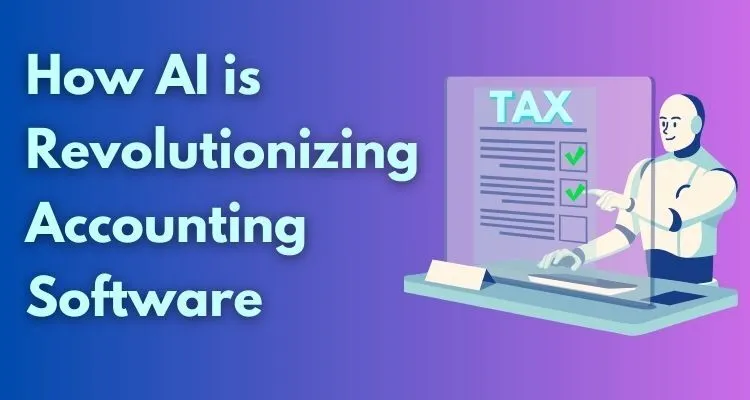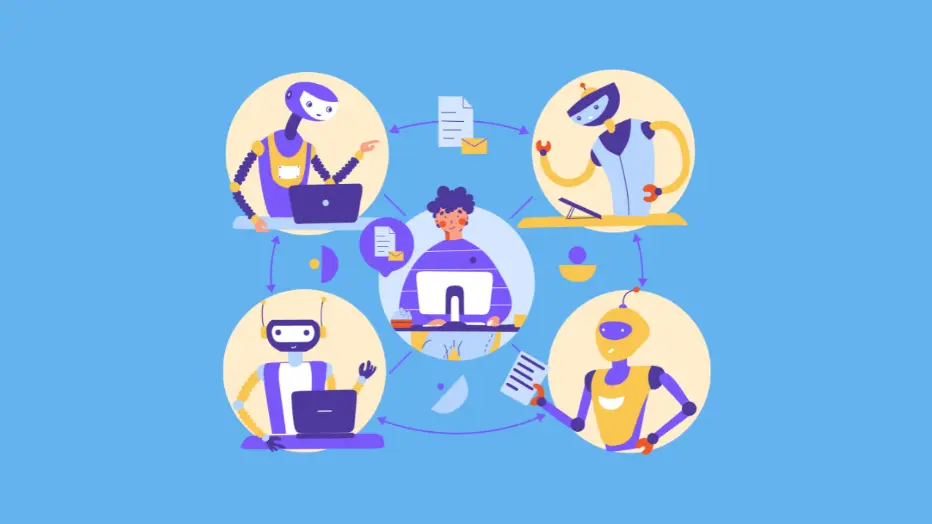- Home
- -Blog
How AI is Revolutionizing Accounting Software

- 19 July 2024
- Shabir Ahmad
How AI is Revolutionizing Accounting Software
Audio Summary
Listen to the audio version of this blog post:
Artificial Intelligence or AI is no longer just a concept from science fiction. It's now a big part of our daily lives and is changing how many industries work. From voice assistants like Siri and Alexa to recommendation systems on Netflix and Amazon AI is everywhere. But what exactly is AI?
AI refers to the simulation of human intelligence in machines that are programmed to think and learn. These machines can perform tasks that usually require human intelligence such as visual perception speech recognition decision-making and language translation. The goal of AI is to make machines smarter so they can help us in various ways.
In recent years AI has become a buzzword in many sectors including healthcare, automotive, retail, and importantly accounting. Modern saas accounting software leverages AI to automate routine financial tasks, deliver real-time insights, and help growing businesses manage accounting operations more efficiently at scale. By automating routine tasks providing deep data insights and improving decision-making AI is revolutionizing how businesses operate. For instance, an AI marketing agency leverages AI to optimize campaigns and deliver personalized content.
The Evolution of Accounting Software
Early Days of Accounting Software
In the early days accounting was a manual process. Accountants spent countless hours recording transactions by hand keeping track of ledgers and making sure everything balanced. It was time-consuming tedious and prone to human error. The introduction of basic accounting software changed all that.
Some accounting software providers offer tutorials or training sessions for artificial intelligence course on how to use their AI-powered tools effectively.
The first accounting software programs were simple and designed to automate basic tasks like bookkeeping general ledgers and payroll. As financial regulations became more stringent, the need for advanced compliance tools grew. AI-powered AML screening solutions emerged to help businesses detect and prevent money laundering activities, ensuring adherence to legal standards and enhancing overall financial integrity.These programs saved time and reduced the chances of errors. However they were still limited in their capabilities and often required significant manual input and oversight.
Emergence of Cloud-Based Accounting Solutions
As technology advanced so did accounting software. The next big leap came with the advent of cloud computing. Cloud-based accounting software brought several benefits over traditional desktop solutions.
Firstly cloud-based solutions allowed for anytime anywhere access. Accountants and business owners could access their financial data from any device with an internet connection. This flexibility made it easier to manage finances on the go and collaborate with team members.
Secondly cloud solutions offered automatic updates and backups.With the support of cloud infrastructure management services, users enjoyed seamless software updates and reliable data protection. These services ensured the system remained secure and operational without manual intervention. Users no longer had to worry about installing software updates or losing data due to hardware failures. The software provider handled all of that ensuring users always had the latest features and their data was secure.
Lastly, cloud-based accounting software was scalable. Businesses could easily add or remove features based on their needs, making it a cost-effective solution for companies of all sizes. This flexibility is especially valuable for eCommerce platforms, using specialized Shopify accounting software, for example, allows businesses to seamlessly manage their finances as they grow and adapt to changing demands.
These advancements set the stage for the next major innovation in accounting software: Artificial Intelligence. AI took these already powerful tools and made them even smarter and more efficient paving the way for a new era in accounting.
Artificial Intelligence (AI) in accounting uses advanced technologies to perform tasks traditionally requiring human intelligence such as automating data entry analyzing financial data and predicting trends. Key AI technologies include:
- Machine Learning: Teaches computers to learn from data recognizing patterns predicting trends and detecting anomalies.
- Natural Language Processing (NLP): Enables computers to understand and process human language automating the handling of invoices receipts and documents.
- Robotic Process Automation (RPA): Uses software robots to automate repetitive tasks like data entry transaction processing and report generation.
AI enhances accounting by:
- Increasing Accuracy and Efficiency: Reduces human error and speeds up data-intensive tasks.
- Automating Repetitive Tasks: Frees accountants to focus on strategic activities.
- Improving Financial Insights: Provides deeper more accurate financial analysis.
AI is revolutionizing accounting by making it more efficient accurate and insightful.
Key Areas Where AI is Making an Impact
Automating Bookkeeping and Data Entry
One of the most time-consuming tasks in accounting is data entry and bookkeeping. Traditionally accountants had to manually enter financial transactions into ledgers and ensure everything was accurately recorded. This process was not only tedious but also prone to errors. Modern accounting workflow software have transformed this landscape significantly.
With AI much of this work can be automated. AI-powered accounting software can automatically categorize and record transactions by analyzing bank statements, receipts, and even an invoice template. This not only saves time but also reduces the risk of human error. For example, AI can recognize recurring transactions and automatically input them, freeing up accountants to focus on more strategic tasks.
Enhancing Bookkeeping Services with AI
Beyond automating routine tasks, AI is transforming the scope and quality of bookkeeping services. By leveraging machine learning algorithms, accounting firms can offer more accurate and insightful bookkeeping services, providing real-time financial analysis and trend detection. AI can flag unusual transactions, reconcile accounts faster, and generate detailed financial reports with minimal human intervention. This enables businesses to access timely and precise financial data, allowing owners and managers to make informed decisions while relying on efficient and reliable bookkeeping services.
Smart Invoicing and Payment Processing
Invoicing and payment processing are critical components of any business's financial operations. AI can streamline these processes significantly. AI-driven invoicing systems can automatically generate and send invoices, track payment statuses, and even send reminders for overdue payments using an AI invoice generator. This ensures that businesses get paid on time and improves cash flow management.
Moreover AI can detect anomalies in payment patterns helping businesses identify potential issues such as late payments or discrepancies. This proactive approach enables businesses to address problems before they escalate.
Expense Management
Managing expenses manually can be a daunting task especially for larger organizations with numerous transactions. AI simplifies expense management by automatically tracking and categorizing expenses. It can analyze spending patterns flag unusual transactions and provide real-time insights into where the money is going.
For instance AI can scan receipts and extract relevant information such as date amount and category eliminating the need for manual data entry. This not only speeds up the process but also ensures accuracy in expense reporting, offering valuable insights for those learning how to create an expense report effectively.
Financial Analysis and Reporting
Financial analysis and reporting are crucial for making informed business decisions. AI enhances these processes by providing deeper insights and more accurate forecasts. AI tools can analyze vast amounts of financial data quickly and identify trends, patterns, and anomalies that might not be obvious through manual analysis, strengthening understanding of the accounting equation: assets = liabilities + equity and how changes in one element affect the others.
Predictive analytics powered by AI can help businesses forecast future financial performance based on historical data. This enables companies to make proactive decisions and plan for various scenarios. AI-generated reports are not only more accurate but also customizable allowing businesses to focus on the metrics that matter most to them.
By transforming these key areas AI is not only making accounting more efficient but also enabling businesses to gain valuable insights and make better financial decisions.
Benefits of AI in Accounting Software
- Increased Efficiency and Productivity: AI automates repetitive tasks like data entry and transaction processing freeing accountants to focus on strategic activities. This speeds up financial operations and enhances productivity.
- Improved Accuracy and Compliance: AI minimizes human errors ensuring accurate and up-to-date financial records. It also helps maintain compliance with regulations by automatically applying the latest accounting standards and tax laws.
- Enhanced Decision Making: AI analyzes historical data to provide insights and predictions about financial trends. This data-driven approach aids in strategic planning and long-term growth.
- Better Fraud Detection: AI continuously monitors transactions for anomalies quickly identifying potential fraud. Its ability to learn and adapt improves fraud detection over time protecting finances and reputation.
- Cost Savings: Automation reduces manual labor and operational costs. AI's accuracy and efficiency prevent costly errors and compliance issues optimizing resources and maximizing ROI.
In summary AI in accounting software boosts efficiency accuracy decision-making fraud detection and cost savings revolutionizing financial management for businesses.

Conclusion
AI is changing accounting software improving efficiency accuracy and understanding. Growing from manual bookkeeping to cloud-based resolutions AI technologies like machine learning and automation decrease mistakes and simplify operations. Fundamental effects possess automatic bookkeeping streamlined invoicing and progressive economic study. The advantages are improved efficiency accuracy decision-making and expense savings.



